
Intelligent Automation
Powering Your Enterprise with Cognitive RPA & AI
R Systems’ mission is to help organizations automate enterprise-wide systems, with an end goal of improving resource & time management and reducing human errors.
R Systems is among the leading professional services providers for Intelligent Process Automation. We assist you in deploying software robots (commonly known as bots) that imitate human steps for repetitive processes. Our goal is to boost your business productivity, ensure compliance, and enhance overall customer experiences.
With R Systems as your technology partner, you will have no limits in delivering greater value to internal and external stakeholders.
Bringing Your Vision to Life with Intelligent Process Automation
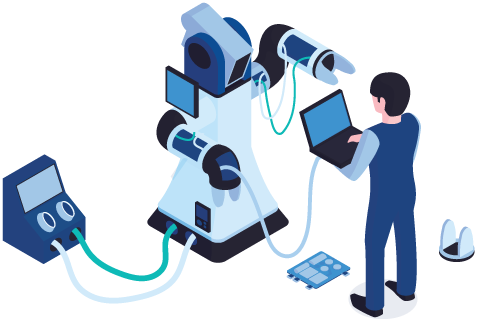
Our Services Include
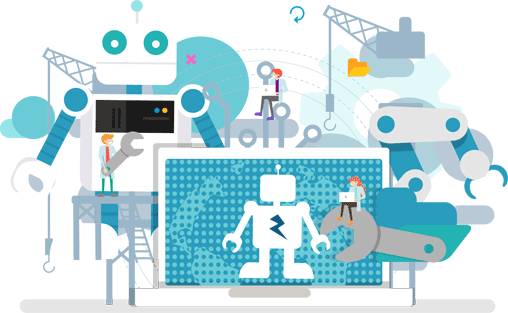
A major portion of your operational costs is used by processes that require the manual swivel chair activities such as data entry into ERP systems. These activities are typically handled by humans, unless they are automated through expensive, complex integration solutions.
With these repetitive, tedious manual tasks, we have an opportunity to employ Intelligent Process Automation to increase accuracy, reduce costs, and positively impact your customer experiences.
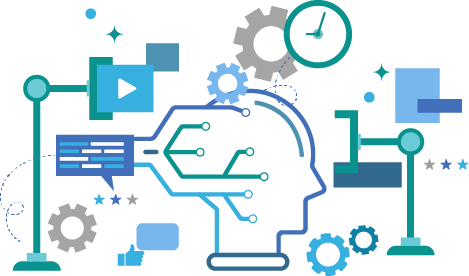
R Systems’ Task Mining allows organizations to:
- Take a data-driven approach to monitor task performance
- Gain richer insights on user actions
- Gather valuable user interaction data
We help you identify and weed out common errors in your manual processing, while discovering opportunities for automation to further enhance business processes. We guide you in harnessing technologies like NLP & OCR to analyze user interaction data and improve performance. Our superior Task Mining processes, enable you to detect inadequacies in manual work, faster than before.
Our Task Mining not only assist you in optimizing the productivity of your workforce, it also helps you identify areas where it matters the most, for guiding your innovation efforts.
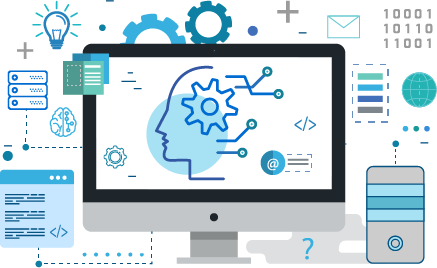
Businesses need to function at optimum capacity to stay cost-effective, compliant, and ahead of the competition.
You cannot afford to focus solely on workforce productivity. Success depends on your ability to continually find ways to enhance processes using Process Mining. R Systems helps you leverage Process Mining and empowers your organization to extract fact-based insights from enterprise systems such as CRM & ERP. We leverage data mapping techniques and visual process analytics to demonstrate the process performance and recommend (and implement) improvements.
Our Process Mining technology also provides predictive and scenario analysis to gain stronger insights into the impact of various process changes before the costly implementation and potential re-work.

Your internal and external customers interact with chatbots that not only provide optimal solutions to their problems, but do so in a human-like engaging manner. Our intelligent bots powered by world-class AI & ML algorithms will meet this customer expectation.
At R Systems, we create bots that use advanced NLP (with NLU & NLG) to successfully analyze & extract intent from your customer interaction. We use deep neural networks & transformer architecture models to enable chatbots that seamlessly adapt to human behavior & intelligent conversations, understand their sentiments, and communicate effectively to resolve an issue or a query. Automated traffic calculations and management systems make the process efficient & fast.
R Systems has partnered with leading Cloud providers to leverage their Conversational AI platforms to develop virtual agents that meet your needs. These include:
R Systems’ AI-assisted bots fostered by AWS advanced service portfolio automates business-critical tasks, while making interactions far more personalized and tailored. Our Chatbot/Speechbot utilizes Amazon Lex and Amazon Transcribe to provide deep functionality and improved flexibility of NLU and ASR (Automatic Speech Recognition). It also utilizes AWS Polly, a TTS (text-to-speech) service, to synthesize speech. This enables organizations to build bespoke bots for highly engaging user experiences.
In addition, we leverage AWS Lambda to offer a server-less computing platform and EC2 (Elastic Compute Cloud) to enable scalable compute capacity. We offer AWS chatbot development, which simplifies the process of tracking and interacting with your AWS resources in various channels and Amazon Chime chat rooms.
R Systems provides Azure bot development services that employ NLU, Dialog Management, and Speech capabilities. We will help you build superior cognitive chatbots and virtual assistants to engender engaging, multiturn conversations.
The bot service can be integrated across numerous communication channels like Microsoft Teams, Skype, Slack, Cortana, Messenger, and your business website and applications to maximize your reach. It can provide insights for informed decision-making. Our bots interpret customer sentiment and intent with Azure Cognitive Services such as Text Analytics and Language Understanding.
R Systems harnesses GCP technology, which works with web chats, Google Assistant on Google Home, and through telephone gateways. Google Dialogflow will provide you with a smart virtual agent with the ability to self-optimize based on customer interactions. It has the ability to learn from real conversations and comprehend human languages better.
GCP bots meet GDPR compliance and protect consumer privacy. They eliminate the need of maintaining VMs, networks, and operating systems, as well as monolithic architecture.
At R Systems, we provide Salesforce Einstein Chatbot integration using diverse APIs to engender stellar customer experiences. Salesforce Einstein chatbot with intelligent conversation can create interactive FAQs using Q&A systems. Businesses can integrate custom-built chatbots with their backend systems and applications to augment customer relationships. AI-enabled bots can effortlessly carry out tasks like changing passwords or checking their account balance by simply interacting with an AI chatbot through your call center application.
We will build digital assistants (aka virtual agents) that your customers can use in their day-to-day lives and activities, such as ordering groceries through a mobile app.
R Systems: Your Automation Partner
From Strategy & Planning, To Execution & Management
From Strategy & Planning, To Execution & Management
Most organizations have a hard time adopting automation due to inept coordination between stakeholders, failure to build convincing business cases, inability to identify appropriate automation opportunities, botched attempts to deploy solutions, and unacknowledged change management issues. Our team of experts at R Systems help you embark on the automation journey with our full spectrum of services from start to finish. Our experienced automation leaders work synergically to ensure successful implementation of your automation efforts, and to maximize the ROI.
Key Benefits for Your Organization:
Speed and Accuracy
Service Delivery
Technology Agnostic
Flexible Engagement Model
Technology Agnostic
Better Strategic Focus
Scaling
Cost-Efficiency
Partner Ecosystems
Sustainable Competitive Edge
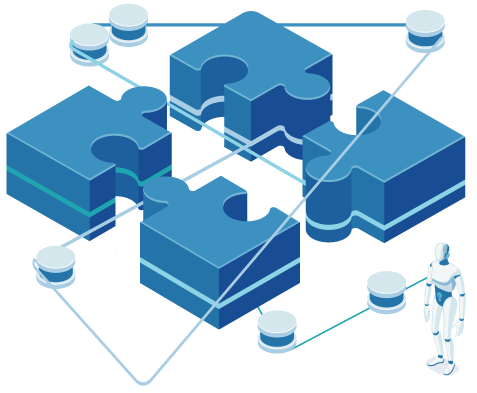
A Forrester report states that the RPA market will be worth $2.9 billion by 2021.
In the modern digital era, an increasing number of businesses across various industries are embracing automation to enhance day-to-day operations and workflows. Industries are now witnessing early adopters of IPA, who are leveraging it to outperform competition and increase ROI at lowered costs.
Banking & Financial Services
Healthcare & Life Sciences
Insurance
Manufacturing
Retail & E-Commerce
Public Sector
Technology
Telecom
IPA can automatically classify & extract relevant unstructured data from customer onboarding documents and transfer it to the bank’s digital management system. The enhanced speed and accuracy create improved customer experiences and faster time to revenue.
The process of appraising & approving mortgages involves data extraction and image recognition, which can be lengthy. Intelligent automation tools can be used to extract pertinent information and analyze images in a matter of minutes. Banks can also leverage IPA to implement workflow automation in the approval process, enabling better efficiency and consistency.
Intelligent technology can improve compliance productivity by minimizing backlogs, eliminating wasted effort through smarter processes, and evolving workforce strategies to meet the latest industry requirements.
IPA enables banks and financial organizations to lower regulatory risks & fines by leveraging a digital workforce. Updating automations with changing regulations lead to reduced errors and allow your teams to focus on tasks that need strategic analysis.
From managing customer accounts and creating data-rich reports to migrating data between accounts and meeting compliance standards, IPA is key to the seamless management of financial processes.
Implementing IPA provides significant risk reduction, faster processes, and highly scalable deployment.
Whether it is streamlining patient appointment scheduling, claims management, pulling up information from multiple sources or completing regulatory forms for clinical development, IPA can enable you to do it all promptly.
IPA bots can streamline patient appointments based on diagnosis, location, availability of doctors, and several other criteria. You can also calculate bill amounts while rapidly processing data for insurance claims - all with the utmost precision. The bots can assist healthcare organizations with implementing discharge instructions, sending reminders to patients about upcoming appointments and medical tests, and more.
IPA can assist in audit procedures by recording data and generating reports. The data can be used to generate analytics that enable accurate diagnosis and customized treatments. When it comes to managing population health systems, IPA is capable of streamlining workflows involved in coordinating healthcare, case and utilization management, as well as remote monitoring.
During a global health crisis, like the COVID-19 pandemic, life science organizations need to reduce time and eliminate delays in submitting new drug applications and completing regulatory documentation. This is crucial to accelerate the introduction of new, life-saving drugs in the market. IPA is the perfect technological ally in such cases.
IPA automates processes such as pulling information from multiple sources, systems, and types of documents, while also facilitating comprehensive documentation required for regulatory agencies. You can easily follow up on communications and implement day-to-day workflows.
In the Insurance sector, fast turnaround times and improved accuracy in claims processing drive improved organizational efficiency and customer satisfaction. As new claims come in, IPA can automate their classification and annotation - while enabling quick evaluation and processing.
Because this is a document-intensive industry, RPA can help greatly by automating claims processing and other practices for providers and insurers.
Commercial underwriting processes can be automated to radically improve all the procedures involved. This results in reduced response times, enhanced accuracy, improved patient experiences, and higher revenue.
IPA can also automate the cumbersome process of collecting data from loss run reports and entering it into the underwriting system. In return, you get an accurate picture of the applicant’s loss history, which aids in optimal decision-making.
IPA has enabled manufacturing companies to outsource tasks such as product assembling, quality checking, and bank-end processing to automated software bots.
The Bill of Materials for the raw materials used to create new products can be easily gleaned by IPA solutions for speedy and flawless creation. This will help create the product much faster, while ensuring greater data accuracy and on-time product delivery.
Moving data from old to new systems can be automated by implementing IPA. Automating inventory management can provide you with real-time data about the inventory levels so you can make better decisions based on historical data.
You can save time by automating invoice process management, which involves obtaining, assigning, and approving invoices. All data can be updated in the respective systems without human interference.
By automating customer service with RPA, you can enable your customers to interact with your customer service management (CSM) system either through a self-help portal or an integrated chatbot application.
The ERP and transport management system can also be automated so you can access all your data in one place and better serve customers.
IPA effectively handles returns processing tasks and makes the necessary changes in the inventory database, as well as customer billing. It also enables smooth workflow management by assigning shifts, recording time and attendance, auditing sales, managing leaves and payroll, evaluating employee performance, etc.
Players in the retail sector can leverage IPA to provide 24/7 customer support and send real-time updates as soon as an order is placed. Even after delivery, your customer support systems can continue to gather sales feedback.
Automating tasks such as billing, tracking price changes, and generating accounting reports can minimize human effort and errors. By integrating an IPA-backed ERP into your warehouse, you will never run out of inventory.
Using IPA in marketing can give you a clearer view of your campaign goals, budget, and specific channels that have scope for improvement. Repetitive actions can be automated to save human effort. Seamless customer experiences can be engendered by assigning attributes and categorizing products.
When used in consumer behavior analysis, IPA can drive store specific planning, introduction of new products, on-board customers from websites, manage subscription renewals, handle claims processing and complaints, manage trade promotions, and more.
Tasks related to supply & demand planning can be streamlined through automation. Retailers can increase capacity and asset management while enhancing experiences for customers, employees, and suppliers.
By automating logistics & supply chain, you can enhance collaboration between customers, suppliers, and distributors. Employees can be empowered to focus on more strategic tasks. IPA helps retailers manage inventory to determine optimum order levels - while improving procurement, reducing wastage, and lowering costs.
Like the commercial sectors, the public sector also experiences issues such as low productivity, workforce shortage, and the lack of collaborative tools. The integration of IPA in the public sector can help enhance outcomes in areas like gathering of information, data management, logistics, and revenue collection.
Some of the major applications of IPA in the public sector include documentation and recording information, calculations, logistical data, improving productivity, collection of revenue, incident reporting, fixing penalties, and so on.
Intelligent automation ensures efficient document handling and validation to improve the performance of government programs, while lowering operational costs. You can get a scalable workforce for efficient reconciliation and reporting. IPA can bring about optimal resource utilization, which automatically leads to significant cost reduction.
Local governments can offer citizens the accessibility & ability to fill important forms & applications via web portals and emails.
Processes involving service inquiries can be streamlined to derive results in minimal time to augment customer experiences.
Ensuring quick update of files with accurate data and maintaining these records is a major advantage of integrating IPA in the public sector. It helps in simplifying processes and allows governmental workforces to focus on value-added tasks.
Financial management also finds great use in IPA as the processes involved are rule-based, and error-prone. To enable risk-free audits, software bots can be deployed to routinize reasoning and eliminate keystroke errors.
Customers typically reach out to customer service or tech support departments for help with their gadgets and devices. These departments are equipped with tools that enable advanced functionality. However, it can be difficult to help customers or employees if these tools are deeply rooted in legacy systems. Intelligent process automation can be used to enable single-click installations of complex systems with symbiotic components.
IPA also finds uses in evolving testing tools, especially when it comes to testing from users’ perspective. Automating these tests can result in their quick implementation, i.e. they can be run after every version upgrade to ensure that any new bug is completely eliminated from the code.
Each feature developed in every new iteration needs to be tested. Automating these tests can improve quality, accelerate results, and enhance product quality.
Service providers in the telecommunications domain often struggle with managing data, increasing business agility, controlling costs, improving business efficiency, and developing new models/services. Further, providing operational services has become increasingly complex. Repetitive processes hamper service providers from focusing on core business tasks - like providing cutting-edge solutions at competitive prices.
Intelligent automation allows telecom players to automate labor-intensive & time-consuming tasks. It simplifies network management processes by automating repetitive jobs like incident, event, navigating complex applications, entering data, retrieving huge amounts of customer information, as well as diagnostics management. This helps network engineers concentrate on more complex processes that improve the network infrastructure.
Automation can also digitize as well as speed up invoice, purchase order, and sales order processing while performing periodic maintenance work, monitoring networks, keeping backups, speeding up back-office operations, and distributing emails.
IPA’s ability to add new customers - and remove them when they leave - helps the telecom players save time, reduce errors, and lower overhead costs. RPA-based intelligent bots can be leveraged to respond to simple customer queries, interpret emails, and redirect the more complex questions to humans, simplifying the overall process of query resolution. RPA supports First Call Resolution rates, which helps telecom firms enhance customer retention as well as employee satisfaction.
IPA can help telecom service providers organize their unstructured data into a structured uniform format, with the ability to work with non-standard data formats. Moreover, AI capabilities can be used to analyze predictive patterns in structured datasets to make more accurate forecasts.
